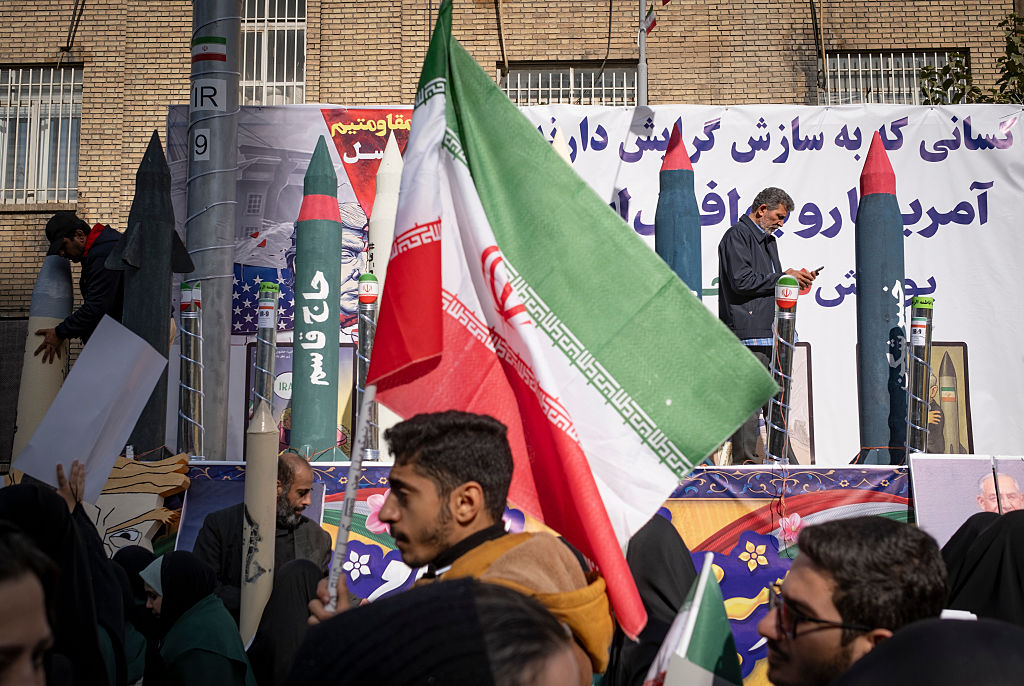Study: Majority Instinct on Iran Is Restraint
A review of existing polling finds Americans skeptical and confused over Iran strikes.

A report made available to The American Conservative by Rethink Media’s Research and Analysis Team on public attitudes toward the June 2025 U.S. strikes on Iran shows that most Americans still prefer diplomacy in dealing with the Islamic Republic when possible. “Restraint remains a majoritarian instinct,” per Rethink Media’s review.
Although the “Iran strikes produced a short-lived rally effect,” the data demonstrate that “Americans entered the crisis favoring diplomacy and ended it divided, with increasing doubts about the strikes’ effectiveness.”
An Economist/YouGov poll before the strikes revealed that a majority of Americans — 61 percent — favored negotiations with Iran, while only 19 percent opposed them. While the Foundation for the Defense of Democracies and other proponents of the military action view the strikes as a successful deterrent to Iran’s supposed nuclear weapons ambitions, large numbers of Americans remain unconvinced; in a University of Maryland/Ipsos poll conducted after the U.S. bombing of Iran, only 30 percent said the strikes made Iran less likely to develop nuclear weapons, while 30 percent said the strikes made it more likely.
The report, which aggregated data from multiple polling firms, also recognizes that, while “Republican and older male audiences” are “more likely to favor deterrence or strength-based” approaches to Iran, “younger Americans were consistently less supportive of military action and more likely to express fear of escalation.” In one CBS/YouGov poll conducted immediately after the strikes, a mere 32 percent of American adults under 30 signaled their approval, compared with 54 percent of Americans age 65 and up.
If most Americans were skeptical of bombing Iran, why did so many Republicans initially embrace the strikes? Rethink’s report attributes the spike largely to “partisan reflexes.” When CNN asked whether respondents “approve or disapprove of President Trump’s decision to take military action against Iran’s nuclear facilities,” 78 percent of Republicans approved. Yet when Economist/YouGov asked during the same period whether the United States “should bomb Iran’s nuclear facilities” — without naming Trump — Republican support dropped to 57 percent, indicating that some Republican responses were driven less by enthusiasm for a new war than by loyalty to Trump.
Another factor, unmentioned by the analysis team yet undoubtedly influential, was the Israel lobby’s long media campaign to convince Americans that Iran and its nuclear program, which is perpetually “weeks” or “months away” from producing a bomb, pose a threat to the United States. Their claims ignored a March 2025 report released by Tulsi Gabbard’s Department of National Intelligence, which determined that “Iran is not building a nuclear weapon and that Khamenei has not reauthorized the nuclear weapons program he suspended in 2003.”
Independents did not have the same partisan reflex as Republicans and Democrats; their views fluctuated, about 20 points depending on whether the strikes were framed as “bombing” or as “launching airstrikes on nuclear facilities,” demonstrating more than anything else the confusion of an American public that was never told why the United States was bombing Iran or what the objective was in the first place.
Their uncertainty grew instantly, and spread beyond independents; within days, more Americans believed Israel benefited from the strikes than believed the United States did. According to a University of Maryland/Ipsos poll cited in the study, only 21 percent of Americans thought the attacks advanced U.S. interests at all, while 30 percent said they mainly helped Israel. Even among Republicans, a relatively narrow majority, 55 percent, believed the strikes reduced the risk of Iran getting a bomb.
The propaganda campaign that preceded the Iran strikes, the temporary spike in public support they produced, and the rapid ebb in enthusiasm echoed the Iraq War. In the run-up to the 2003 invasion, majorities of Americans told Pew they believed Saddam Hussein possessed weapons of mass destruction, was tied to terrorism, and had even helped orchestrate 9/11. That war’s popularity reached a peak of 74 percent support at the time of Bush’s “Missions Accomplished” speech, before plummeting on a consistent trajectory every year since, as Americans realized they had been deceived and bankrupted. By 2019, most Americans, including 64 percent of U.S. veterans, concluded the war had not been worth fighting.
If Trump truly believes the Iraq War was one of the greatest U.S. foreign policy disasters, he should rediscover the instinct for negotiation that set him apart from the neoconservatives he defeated.
The post Study: Majority Instinct on Iran Is Restraint appeared first on The American Conservative.

